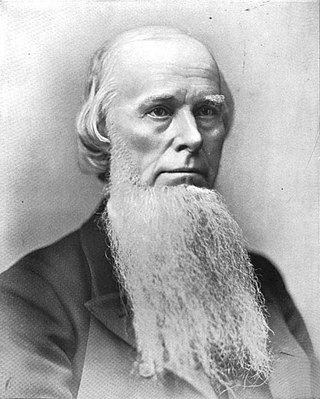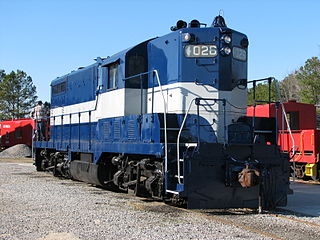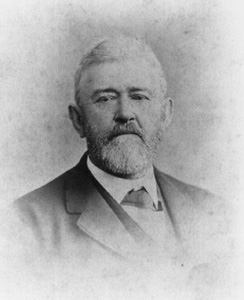
Eufaula is the largest city in Barbour County, Alabama, United States. As of the 2010 census the city's population was 13,137.

Milledgeville is a city in and the county seat of Baldwin County in the U.S. state of Georgia. It is northeast of Macon, bordered on the east by the Oconee River. The rapid current of the river here made this an attractive location to build a city. It was the capital of Georgia from 1804 to 1868, including during the American Civil War. Milledgeville was preceded as the capital city by Louisville and was succeeded by Atlanta, the current capital. Today U.S. Highway 441 connects Milledgeville to Madison, Athens, and Dublin.

Joseph Emerson Brown, often referred to as Joe Brown, was an American attorney and politician, serving as the 42nd Governor of Georgia from 1857 to 1865, the only governor to serve four terms. He also served as a United States Senator from that state from 1880 to 1891.

The Georgia Railroad and Banking Company also seen as "GARR", was a historic railroad and banking company that operated in the U.S. state of Georgia. In 1967 it reported 833 million revenue-ton-miles of freight and 3 million passenger-miles; at the end of the year it operated 331 miles (533 km) of road and 510 miles (820 km) of track.

The Atlantic and Gulf Railroad was chartered in February 1856 by act of the Georgia General Assembly. It was also known as the Main Trunk Railroad. It traversed south Georgia from Screven to Bainbridge, Georgia. Construction began in early January 1859. Its construction was halted by the American Civil War. Construction began again after the end of the war and the line was completed to Bainbridge, Georgia by late December 1867. The route never reached all the way to the Gulf of Mexico as it had originally intended. The company went bankrupt in 1877 and was bought in 1879 by Henry B. Plant and became incorporated into his Plant System. Its main line is currently operated by CSX Transportation. Throughout its history, the Atlantic and Gulf was closely associated with the Savannah and Albany Railroad Company and its successor the Savannah, Albany, and Gulf Railroad.

The Central of Georgia Railway started as the Central Rail Road and Canal Company in 1833. As a way to better attract investment capital, the railroad changed its name to Central Rail Road and Banking Company of Georgia. This railroad was constructed to join the Macon and Western Railroad at Macon, Georgia, in the United States, and run to Savannah. This created a rail link from Chattanooga, on the Tennessee River, to seaports on the Atlantic Ocean. It took from 1837 to 1843 to build the railroad from Savannah to the eastern bank of the Ocmulgee River at Macon; a bridge into the city was not built until 1851.

Wanderer was the penultimate documented ship to bring an illegal cargo of enslaved people from Africa to the United States, landing at Jekyll Island, Georgia, on November 28, 1858. It was the last to carry a large cargo, arriving with some 400 people. Clotilda, which transported 110 people from Dahomey in 1860, is the last known ship to bring enslaved people from Africa to the US.
The Brunswick and Western Railroad is a historic railroad in southern Georgia that at its greatest extent ran from Brunswick near the coast to Albany. Segments of the line still exist today. The Brunswick and Florida Railroad ran from Brunswick west to Glenmore, where it would connect with the Atlantic and Gulf Railroad.

Richard Francis Lyon (1819–1893) was a Georgia attorney and jurist before and during the Confederacy. He was the mayor of Albany, Georgia, from 1858 to 1859 and an associate justice of the Supreme Court of Georgia from 1859 to 1865.

The Georgia Trust for Historic Preservation is the United States' largest statewide, nonprofit preservation organization with more than 8,000 members. Founded in 1973 by Mary Gregory Jewett and others, the Trust is committed to preserving and enhancing Georgia's communities and their diverse historic resources for the education and enjoyment of all.

The Fall Line Freeway (FLF), also signed as State Route 540 (SR 540), is a 215-mile-long (346 km) highway designed to span the width of the U.S. state of Georgia from Columbus at the Alabama state line to Augusta, travelling through several cities including Macon, Fort Valley, Sandersville, and Wrens. Though it is called a freeway, it is composed of both limited-access and high-speed divided highway portions. There are also two segments of the highway that are two lanes, separated by a center turn lane: a brief portion in west-central Washington County and another brief portion in northern Jefferson County. As of August 2018, the Fall Line Freeway is 100% open to traffic. Between August 2017 and July 2018, the highway was completed. The Georgia Department of Transportation (GDOT) announced that the highway was officially signed as SR 540 on September 24, 2018, as the newest state route in the state.

Georgia was one of the original seven slave states that formed the Confederate States of America in February 1861, triggering the U.S. Civil War. The state governor, Democrat Joseph E. Brown, wanted locally raised troops to be used only for the defense of Georgia, in defiance of Confederate president Jefferson Davis, who wanted to deploy them on other battlefronts. When the Union blockade prevented Georgia from exporting its plentiful cotton in exchange for key imports, Brown ordered farmers to grow food instead, but the breakdown of transport systems led to desperate shortages.

Slavery in Georgia is known to have been practiced by European colonists. During the colonial era, the practice of slavery in Georgia soon became surpassed by industrial-scale plantation slavery.
The following is a timeline of the history of Savannah, Georgia, United States.

Charles Augustus Lafayette Lamar was an American businessman from Savannah, Georgia, best known for his leadership in an investment ring to illegally import slaves from Africa on the ship Wanderer in 1858. The ship ran blockades and brought 409 surviving Africans from the Congo to the United States for sale. The ship was later impounded. Although Lamar and numerous other defendants were prosecuted, none of them were convicted.
Chattanooga Union Station, more commonly known as the Union Depot in Chattanooga, constructed between 1857 and 1859, served as a train car shed in Chattanooga, Tennessee. Located at Broad and Ninth Streets, the station was one of two major railroad terminals in the city, the other being the Southern Railway's Terminal Station.
Ransom Montgomery was an American slave, the only slave owned by the state of Georgia, and the second black person to own property in Atlanta.

Andrew J. Orr and Dickinson W. Orr, typically advertising as A. J. & D. W. Orr, were brothers, merchants, planters, railroad contractors, and slave traders based in Macon, Georgia, United States. The Orrs were originally from the Charlotte, North Carolina area, but moved to central Georgia early in their lives and remained there, first working as local merchants and then transitioning into the interstate slave trade, buying in the Carolinas and Richmond, Virginia, and selling to planters in the vicinity of Macon and Augusta, Georgia. They then became railroad contractors as well, using groups of enslaved men to build three separate Georgia railroad lines. A. J. Orr was beaten to death by a slave in 1855. D. W. Orr continued working as a railroad contractor until at least 1863. He died in 1867.

Nelson Clement Trowbridge, usually doing business as N. C. Trowbridge, was an American businessman who worked as both a merchant and farmer in Poughkeepsie, New York, and a slave trader in the Deep South for approximately 25 years prior to the American Civil War. Trowbridge trafficked in slaves in Virginia, the Carolinas, Georgia, and Louisiana. He also became a plantation owner in Mississippi. He was party to the illegal importation of slaves from Africa on the Wanderer in 1857. Many of the letters written by C. A. L. Lamar about his illegal transatlantic slave trade enterprise of the late 1850s were addressed to Trowbridge ("Trow") in New Orleans. Lamar and Trowbridge, who had had several businesses together, from breeding racehorses to mining for gold, were responsible for at least one blockade-runner, the Ceres, during the American Civil War. Trowbridge was arrested on treason charges twice during the war, and convicted in 1864 of treason and blockade running. The New York Herald and other newspapers deemed him a New York-based Confederate spy and business agent. He seems to have lived in New York City and Mississippi after the war. He died in Mississippi in 1879 and is buried in Augusta, Georgia.















